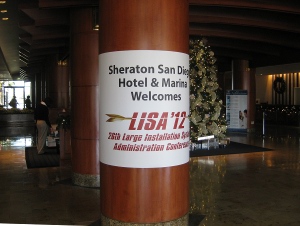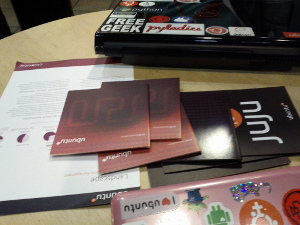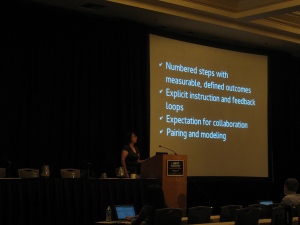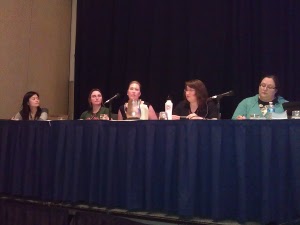This week I attended my first Large Installation Systems Administration conference, LISA ’12 in San Diego. I worked Monday and Tuesday this week and took a 7AM flight to San Diego on Wednesday morning.
I made it to the conference center just in time to see the beginning of Vint Cerf’s keynote where he talked about the rapid expansion of devices on networks, IPv6, some of the networked gadgets he’s been using and wrapped up by talking a bit about strategies for interplanetary networking being employed by the Mars rovers and beyond.
Thankfully they had my room available early so I was able to drop off my bigger laptop in my room.
I then headed to the “OpenStack: Leading the Open Source Cloud Revolution” talk by Vish Ishaya. I played around with DevStack in the spring, but have recently been giving myself more of a crash course in it. The more I learn about this project the more excited I am about it, so it was great timing for me to hear Ishaya’s talk where he covered the project history, core components and key plans for the future and technical requirements for projects wishing to join. I’m continually impressed with not only how very solidly grounded it is in general open source ethos and ability to support many different back-ends, but how much amazing corporate sponsorship it has managed to gather in it’s relatively short lifespan.
The other talk I attended that day was “System Log Analysis Using BigQuery” by Gustavo Franco. While I currently don’t have a need for massive log analysis tools, it’s always nice to know that products like BigQuery and Splunk exist should the very real need arise.
Once talks wrapped up for the day I met up with Philip Ballew to wander around a bit of the San Diego downtown before heading over to a local Starbucks for the San Diego Ubuntu Hour.
There were a total of 6 attendees at the hour and I had the great pleasure of meeting David Stilson who I had previously only conversed with over email. A former teacher, David has experience with Moodle and is interested in working on developing the Ubuntu Learning materials. I’m always apprehensive about talking to formal teachers about my (lack of) college-level education, but talking with him about his impressions of the current education system was quite interesting and made me feel significantly more comfortable discussing it. Conversation also went to the struggles I had in primary school, which prompted him to point me in the direction of John Gatto’s Underground History of American Education. As a teacher and course developer, he was also able to explain some of the key parts of what will make the classes we write effective, I’m really excited to start working together.
Thursday morning started off with Selena Deckelmann’s “Education vs. Training” talk. It was quite the inspiring talk to hear following my experience at the Ubuntu Hour the evening before!
What I’ve really had impressed upon me these past few days regarding developing educational material for these things I want to teach on the Ubuntu desktop is how vital the process of explicit objectives and defined outcomes so that students can be appropriately taught and evaluated. Deckelmann also shared some great links to free sysadmin-focused courses that are being developed: LinuxTraining.be and Ops School. The discussion that occurred following her talk was also very interesting, getting into how we “teach students to learn” as well as having a focus on core objectives which are to be defined and whether it was at all possible to get the very valuable mentorship relationships that many sysadmins depend upon to succeed to scale.
I then went to Dude, Where’s My Data? Replicating and Migrating Data Across Data Centers and Clouds presented by Jeff Darcy where he outlined the challenges of Big (and Bigger!) Data as our infrastructures become more virtualized and computing is further abstracted into the cloud. He covered many facets of the challenges, including volume of data, rate of change, variety of data, distance over which you’re replicating (LAN, WAN, worldwide…), how many copies are being made and how concerned one should be about data divergence (how much divergence is a problem for a specific application or service, etc). He then went on to talk about syncronous vs asyncronous data backup methods through the years, including some of the legacy strategies and even use of rsync.
The next panel was the one I was on, “Advancing Women in Computing”! I realized once I got up there that it had been well over a year since I’d been on such a panel. I was really impressed with the tactfulness of my fellow panelists on this difficult subject, and their ability to be so open about their own experiences and successes. I think the general tone of the panel was positive and helpful, giving real advice to folks looking to increase the number of women and other minorities in computing and in their own organizations. And thanks to everyone at the conference who came up and talked to me after the talk, it always means a lot to hear positive and encouraging words after such a panel.
The day wrapped up with a really fun plenary session, NSA on the Cheap by Matt Blaze. His team at the University of Pennsylvania discovered a number of security weaknesses in P25 two-way radio system used by the US government, military and local services. He discussed the lack of authentication, susceptibility to traffic analysis, vulnerability to specifically-crafted DoS attacks that can be accomplished with a $15 instant messaging toy and the many social and human problems with the technology and UI that lead to a “significant” amount of sensitive data going over the air in the clear. The University has been working with several government agencies to discuss their findings work through these problems.
The LISA ’12 Reception was held that evening, with attendees boarding a bus to take us to the boat for a 6:30PM cruise around the San Diego harbor. I don’t know a whole lot of people here so I was a bit shy about attending, particularly knowing I’d be stuck on the boat for the full 2 hours regardless of whether I wanted to flee. Fortunately the night turned out to be really awesome! On the bus ride over I met Jennifer Hadley of the University of Saskatchewan and once on the boat had dinner with her, Deborah Wazir and Meryll Larkin. I always enjoy hanging out with other sysadmins, but to be spending time with a trio of other female sysadmins who had left their husbands at home was a particular delight. Thanks for a wonderful evening, ladies!
Friday was the last day of LISA! I started off my day by going to a couple of DNSSEC talks. I was happy to learn more about an EDNS+old firewall packet blocking problem I had recently encountered so I have something to look at when I get back to work on Monday. The second talk was about the US Federal .gov transition to DNSSEC and the challenges they faced and tips they have for others who embark on it, including: insuring each organization has up to date point of contacts for technical and security-related changes, encourage automation for many of the DNSSEC maintenance operations and foster an internal community of admins to share solutions.
The last panel and talk of the day were remarkably similar – the first was a panel on “Disruptive Technology” talking about our world now with an ever-changing variety of technologies, the latest of which is the whole cloud world with the specific networking, configuration and storage needs that it presents. The last was “15 Years of DevOps” where presenter Geoff Halprin provided a history of where he saw software development and systems administration from the 1980s onward. It was an interesting history and a perspective of DevOps in the world of sysadmins and developers that I hadn’t really thought about before.
In all, great conference! Had some nice talks with people and it was nice to catch up with others who I don’t get to see often.








Monday, Dec 17th, 2012 at 6:45
The Usenix folks should give you a kickback for this conference report — I’m now green with envy and vowing to go next year even if I need to pay my own way. :-) (And eventually I will attend one at the same time as you and get to see you speak!)